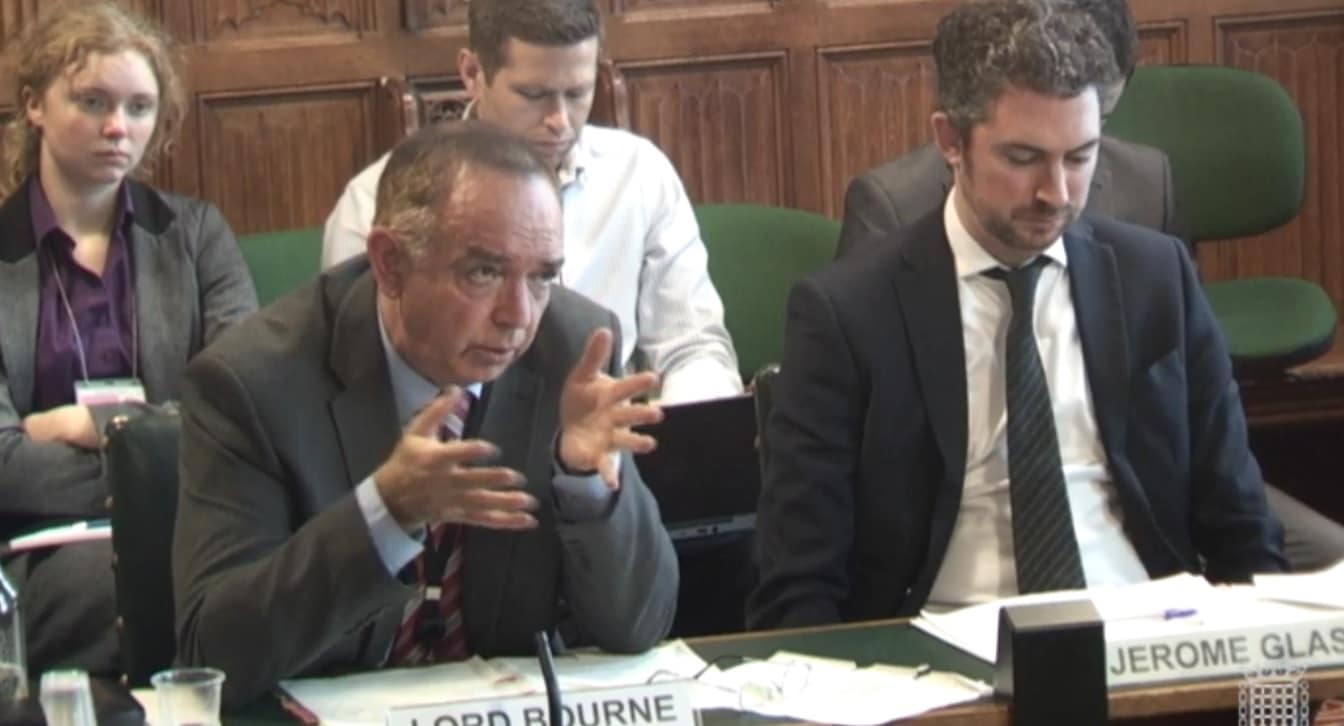Lord Bourne, Parliamentary Under Secretary of State for the Department for Energy and Climate Change (DECC), has dodged questions on whether the government will adopt recommendations set forth by the Committee on Climate Change for the UK’s fifth carbon budget for 2030.
Last November, the Committee on Climate Change (CCC) recommended the UK cut its greenhouse gas emissions by 61 percent below 1990 levels during its fifth carbon budget period from 2028 to 2032.
The CCC, which advises government on how it should tackle climate change, has also stated that the 2030 target is the “minimum level” required to meet the goals laid out in the Paris climate deal.
DECC must set its fifth carbon budget target in law before the end of June. And, as DeSmog UK reported last month, MPs and NGOs have been calling for increased government transparency on how it plans to adopt a credible, clear and coherent strategy for cutting emissions.
Speaking to MPs yesterday during the Energy and Climate Change Committee hearing on the fifth carbon budget, Lord Bourne said: “I’m certainly not going to say we’re not accepting [the CCC’s] advice but I’m not going to say either that we are accepting it.”
“Discussions are ongoing,” he explained. “We regard [the CCC’s] advice with great respect as we always have done… We have always followed their budgets previously but you’ll understand that I can’t really comment at this stage until we actually publish it publicly as to what we’re precisely doing in relation to this budget.”
Lack of Clarity
Following last summer’s series of surprising cuts to green policy many now wait anxiously for the government to reveal its plans on how it aims to address climate change.
Amber Rudd, DECC Secretary of State, confirmed in January that the department will set out a new emissions reduction plan “by the end of the year”.
As it stands, the UK is set to miss its 2020 renewable energy targets – this was confirmed both in a leaked government letter written by Rudd last November and a government update in January 2016.
And the CCC’s chairman Lord Deben has previously warned that the policy cuts last summer have left a significant low carbon policy gap. “Uncertainty created by changes to existing policies and a lack of replacement policies up to and after 2020 could well lead to … a risk that targets to reduce emissions will be missed,” Lord Deben warned.
Similar concerns were raised repeatedly by MPs on the Committee including from both Labour MP Rushanara Ali over the government’s apparent lack of ambition and recent policy changes, and Conservative MP Glyn Davies who argued that while the government is clear about what it’s not doing, “there’s not much clarity or understanding about what the government is going to do”.
MPs also pressed Lord Bourne for greater clarity on who else it would be consulting with should it decide not to adopt the CCC’s recommendations – or as Committee chairman Angus MacNeil asked, would the decision come down to “just a feeling in the department?”
“It’s not just the department that’s looking at this, we’re looking at this across government because it involves other government departments,” Lord Bourne answered, adding that “we do have to consider other factors as well under [the Climate Change Act] – economic, fiscal, social, and international – and that’s what we’re doing.”
A Challenging Commitment
Lord Bourne did, however, acknowledge that meeting the UK’s legally binding climate targets will be challenging.
“We do agree there is a challenge,” he told MPs, “there is a significant ramping up between the third and fourth budget and it’s for government to step up to the plate and do something about that.”
Lord Bourne also said he disagreed “very strongly” with the argument put forward by some voices critical of climate action that there doesn’t need to be a fifth carbon budget because the UK’s carbon emissions are relatively small when compared to India or China.
He said: “It is totally inappropriate I think to say our position is minor. If every country adopted that process it would lead us to hell in a handcart very quickly.”
“We’re committed to Paris,” Lord Bourne continued. “The message to investors, the message to industry, to the country, is we are very much committed to decarbonisation.”
However, he also stressed the need to address affordability and energy security, and described the competing priorities as “a bit of a tightrope act.”
Subscribe to our newsletter
Stay up to date with DeSmog news and alerts







